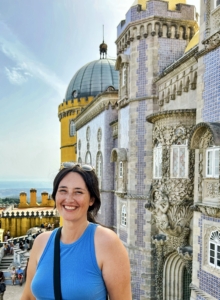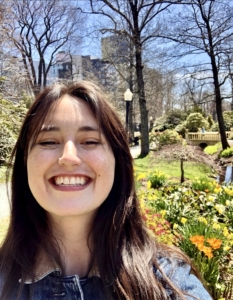 Marisha Iverson (she/her) is YWCA Banff’s Harmony Project Coordinator and is well-versed in the social service sector.
Marisha Iverson (she/her) is YWCA Banff’s Harmony Project Coordinator and is well-versed in the social service sector.
Marisha has always wanted to make a difference in the world —and it shows. She’s dipped her toes in different social service sectors and in the criminal justice system throughout the years. You might even recognise her from the Family Connection Centre in Canmore, where she assisted with prevention and early intervention work with children and families. Her resume is extensive, from her work with the Bow Valley Homelessness Society, the Banff RCMP Detachment, and the Crown Prosecution office in Edmonton. It’s safe to say, she’s well versed in the social service sector and has a deep understanding of it from a variety of perspectives.
Marisha lights up when talking about the Harmony Project’s focus on culture change in a broader scale. “This is quite rare in social work,” says Marisha. “Most social work is intervention, rather than prevention.”
But there’s one thing that we haven’t mentioned, and it’s her personal connection to this line of work: Marisha has experienced a variety of forms of sexual violence, including sexual harassment while working in the hospitality industry.
Chances are, if you’ve lived in the Bow Valley long enough, you’ve probably worked in the hospitality industry. It’s a path that many of us share, including Marisha, who started working as a server in Banff when she first moved here in 2016. Her partner at the time also worked as a maintenance worker there.
She came into an environment, becoming increasingly uncomfortable every time her supervisor addressed her using terms like ‘darling’. Unfortunately, this is an experience that most women in the service industry share. She knew it felt off, but she wasn’t quite sure what to do about it—and it continued to escalate.
Her partner would eventually share that the supervisor was making derogatory comments about her in conversations with him. As her anxiety continued to grow while her sense of safety diminished, she took the next step, reporting the supervisor’s behaviour to management. Unfortunately, her story doesn’t stop there.
The supervisor was eventually fired, but the problem remained: Marisha didn’t have a voice.
Upper management never checked-in with her. They never asked how she’d like to proceed, how she was doing, or provided any follow-up. Marisha was expected to continue working as if nothing happened. They only spoke to her partner and the person who harmed her —never giving her a space to be heard.
Her partner invalidated her, upset to be part of the complaint. He didn’t want any part of it and didn’t see himself as part of the problem. On top of this, she felt blamed by some co-workers for getting her supervisor fired. In a situation like this, a simple comment like “I believe you and it’s not your fault” or question like, ‘How can I support you?’, could have gone a long way.
Like many others, when Marisha first moved to the Bow Valley, she lacked a support system. She wasn’t aware of the services that exist in our community—including YWCA Banff.
She was alone and so, she quit.
Other female coworkers would eventually confide in her, sharing their stories of similar experiences with the same supervisor. What would have happened if she hadn’t reported it? How many more would be harmed?
Growing up, Marisha also experienced childhood sexual abuse, and like her experience of sexual harassment, she is not alone. Just under one in two girls (44%) and one in four boys (24%) in Alberta experience child sexual abuse (AASAS, 2020). Marisha is open about some of her experience and stresses the importance of talking about sexual violence to shift the culture around it. By sharing her personal experiences she’s learnt that she is not alone, and that no one who has experienced sexual violence, including herself, should carry shame. She is passionate about engaging with community members, wanting the Harmony Project to be “by the community, for the community.”

Her enthusiasm comes out when she talks about the Harmony Project’s focus on preventing sexual violence through culture change. She points out one of her favorite quotes, citing Desmond Tutu: “There comes a point where we need to stop just pulling people out of the river. We need to go upstream and find out why they’re falling in.” It’s important to Marisha that we recognize all forms of violence, including sexual violence, are part of oppression.
She notes sexual violence disproportionately impacts women, girls, and people who live with more than one marginalized identity, such as Indigenous women, girls, and two-spirit people (AASAS, 2020; Stats Can, 2018). Racism, colonialism, sexism, homophobia, and ableism are all systems of oppression that shape all our attitudes and beliefs and perpetuate sexual violence. Together we can create a safer, more inclusive Bow Valley.
It’ll take a community effort to change the attitudes and beliefs at the root of sexual violence and we’re excited to have Marisha help lead this work. To learn more about the Harmony Project, visit harmonyproject.ca or connect with Marisha directly via email at .